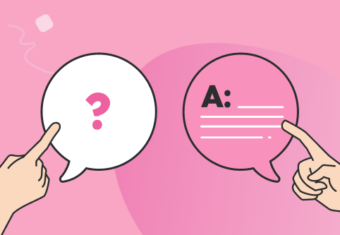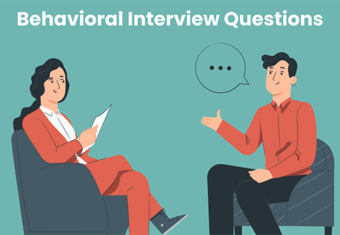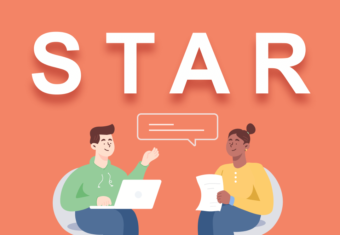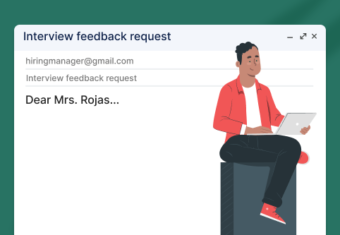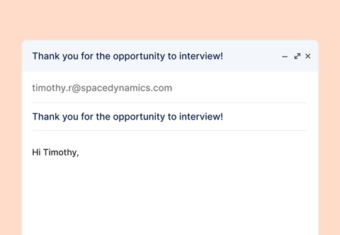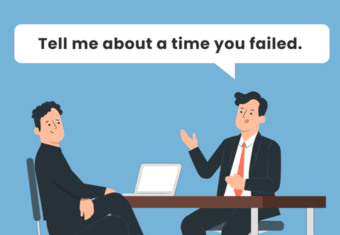Phone interviews are used to screen candidates for a job and get a sense of what you’d be like to work with.
Phone interviews are usually shorter (15 to 30 minutes) and more to the point than your standard interview. However, the interview questions asked during a phone screening aren’t any easier than during a full-length interview.
The best way to prepare for a phone interview is by familiarizing yourself with common phone interview questions and thinking about your answers ahead of time. Here’s a list of 17 questions you’re highly likely to get asked and some sample answers:
1. Tell me about yourself
“Tell me about yourself” is usually the first question asked during a phone interview. Interviewers usually ask this question to break the ice and get to know more about your background.
A great way to start your response is by providing a brief overview of your professional experience. Specifically, you should emphasize experiences that relate to the job you’re interviewing for.
When asked this question, many candidates make the mistake of telling their life story, which isn’t what interviewers are looking for. Instead, discuss your goals and why you’re interested in the job.
How to answer
“I’m a recent graduate of the University of Arizona with a B.A. in Journalism, and I’m very excited to begin my career. I think that my academic background, combined with my strong work ethic and excellent research skills will make me a valuable asset to the agency.
In my spare time, I manage a podcast and regularly interview student entrepreneurs in Arizona state on a variety of topics. I enjoy being in the field and sharing people’s stories to get my audience thinking about how they can make their community a better place. I hope to expand my influence to a wider audience and give a voice to people who aren’t usually heard.”
2. Why do you want to work here?
Interviewers often ask “why do you want to work here?” in phone interviews because they want to confirm that you’re excited about the position and aren’t just interested in a paycheck.
When answering this question, start by explaining what caught your attention about the job listing and why you’re interested in the company. Be sure to focus on how your hard skills, transferable skills, and experience make you the perfect fit for the job.
In the following sample answer, the candidate not only mentions one of her greatest accomplishments and skills but what attracted her to the position and how she can contribute to the company:
How to answer
“I want to work here because the job encourages the use of creativity and thinking outside the box. In my previous job, I increased sales by 25% because of my ability to come up with unconventional ideas to solve problems.
I’ve been a fan of your app ever since it came out, and when I saw the company was hiring, I knew I could bring my five years of experience to help contribute to the company’s growth.”
3. What are your strengths and weaknesses?
When responding to this common phone interview question, you’ll want to talk more about your strengths than your weaknesses.
Pick some of your strengths that overlap with the requirements in the job ad. Then provide real examples of how you’ve put these strengths to work.
When talking about your weaknesses, however, focus on general skills that don’t directly impact your ability to do your job. For example, having poor communication skills is an okay weakness to have if you’re applying for a software developer position that doesn’t require regular communication with other people.
How to answer
“I’d have to say I’m highly efficient and very reliable. Before starting my week, I always carefully plan out each day to break down and prioritize tasks. Because of this, I’ve consistently submitted reports and projects well ahead of deadlines, and my manager trusts I’ll always get the job done.
Although I consider these strengths, I’ve also been told I tend to put results before everything else and want to take charge of a project immediately. I’ll tend to assign tasks to team members for even higher efficiency, and this has sometimes led to stressed relations with coworkers.
However, I’ve been working on communicating better with teammates and being more aware of their availability to avoid unnecessary tensions in the workplace.”
4. What is your greatest achievement?
Many candidates feel answering this question can make them sound arrogant, but hiring managers want to see what kind of results you can deliver.
A great way to respond to “What is your greatest achievement?” is by describing an accomplishment that showcases one of your most job-relevant skills or strengths.
You can start by talking about a challenge you faced and how you overcame it. Or you can discuss the outcome of your achievement and what impact it had on your career or the company you worked for, like the candidate in this sample answer:
How to answer
“My greatest achievement would have to be the successful launch of a project I managed during my time working at XYZ Company. The project was a complex undertaking that involved coordinating multiple teams and departments over a period of seven months.
Even with tight deadlines, we were able to get the job done on time while meeting all of our objectives. Since the successful completion of that project, XYZ company attracted dozens of new investors and over $20 million in additional revenue. Looking back on it now, this experience consolidated my desire to become a project manager.”
5. Where do you see yourself in 5 years?
Interviewers commonly ask “where do you see yourself in 5 years?” during phone interviews to get an idea of your career goals.
When answering this phone interview question about your job goals, stay focused on why you’re interested in the position you’re applying for. You want to make sure that your goals are aligned with those of the company, so explain why the role seems like a good fit for you based on your research.
Be honest and talk about short-term and long-term goals that are relevant to the role you’re applying for while staying realistic.
How to answer
“I’m looking to take on greater responsibilities and grow with the company. I would like to be promoted to a district manager position within the next two years and eventually move into a regional management role. I’m confident that with my 5 years of experience and excellent track record, I have the potential to reach these goals.”
6. Why did you leave your last job?
Answering “why did you leave your last job?” successfully requires diplomacy and tact.
Focus on the most positive aspects of your previous job and on what excites you about the new position.
If you left your previous job because of personal reasons or health issues, you can also explain that information, like this nursing candidate does:
How to answer
“I left my last job because I was looking for an opportunity with a more flexible work schedule to meet a family member’s health needs. I had been working as a registered nurse in the same hospital for ten years, and while I loved my job, the long shifts made it difficult to coordinate proper care for that family member. Going forward, I’m looking for a position with more flexibility that would still allow me to contribute to community health.”
7. Tell me about a time you failed
“Tell me about a time you failed” is an interview question that trips up a lot of job seekers, even when you’re just talking over the phone.
This question is understandably difficult to answer because you don’t want to respond in a way that’ll hurt your chances of landing the job.
The key to answering this prompt is to be honest. Although you weren’t at your best at that time, be sure to choose a situation that doesn’t directly impact your ability to perform the job you’re applying for. Then, explain what you’ve done to improve yourself so that a similar situation doesn’t happen again.
Hiring managers want to see that you’re self-aware and continuously willing to better yourself, which this candidate does in their sample answer:
How to answer
“While I consider myself to be a hard worker, I’ve had a specific instance where I wasn’t able to meet a deadline due to poor time management. This is something that I’m constantly working on, and have been making an effort to plan my days more efficiently.
I had underestimated the time it would take to complete a project that required urgent attention and wasn’t able to appropriately deliver a presentation on a new product we were working on. Because we had to reschedule to accommodate everyone’s availabilities, this caused a significant delay in the final design approval and manufacturing process.
I’ve tried several methods to improve my focus and concentration, as well as learning to prioritize tasks better. Although I’m still in the learning process, I haven’t missed a deadline in the past three months.”
8. How would you describe your work style?
When answering interview questions about your work style, take the opportunity to explain how you approach tasks and provide tangible examples of actions you’ve taken in the past.
Remember that an interview is a two-way street: it’s essential that the company’s management style is a good fit for you. And while it’s a good idea to highlight your dedication to achieving results, it’s important to be honest with how you work best.
In this example, the candidate illustrates that while their work style produces results, they’re also open to accommodating different work styles:
How to answer
“I’m a highly driven individual who likes to be constantly moving and always has several tasks going simultaneously. I’m very efficient thanks to my excellent multi-tasking skills. In fact, I’ll usually get the job done well ahead of schedule.
Recently I’ve been given more team projects to contribute to, and I’ve learned to adjust my work style to plan out each step of a project in detail and make sure that all team members are aware of their role in completing it.”
9. How do you handle stress and pressure?
You’ll usually hear this question if you’re doing a phone interview with a startup, a restaurant, or some other fast-paced work environment. Hiring managers ask this phone interview question to determine if you’re easily overwhelmed or if you keep a cool head in stressful situations, which you’re often likely to come across.
If you know you don’t handle pressure very well, explain in your answer what you’re doing to improve your ability to work under stress.
How to answer
“I handle stress and pressure by always staying organized and keeping on top of my deadlines. I avoid procrastination at all costs, so I know that I can always count on completing my tasks on time.
I also try to take some time for myself every day to relax and de-stress, whether it’s taking a short walk outside or going up to the office rooftop for some fresh air. It’s important for me to make sure that I’m taking care of myself so that I can stay focused when things get tough.”
10. What do you know about our company?
Before starting an interview, it’s important that you do your research on the company.
This helps you understand the company’s values and culture and how you might fit in. This includes potential issues the company is facing that you could solve or how you would make a great addition to the team in terms of work culture.
The candidate in the following sample answer shows they’re not only on top of the company’s current events but also familiar with common business practices:
How to answer
“I’ve read a few articles about your company, and I was impressed by the way that you’re always striving to innovate and stay ahead of the curve. I think that your commitment to customer satisfaction is also evident in your strong following and the way that you go above and beyond to deliver excellent service.
Despite being new on the scene, I think that your company represents the best of what the industry has to offer, and I believe more small businesses should follow your initiatives. I would be more than proud to be associated with XYZ.”
11. Tell me what you know about the role
This typical phone interview question is pretty straightforward. Hiring managers just want to confirm that you’ve read the job description carefully and understand the role’s requirements.
Avoid repeating the job description but expand on how your skills and strengths are well-suited for the role. Impress the interviewer by mentioning current projects or initiatives related to the role.
This candidate for a school counselor position not only demonstrates their understanding of the position but circles back to how they could make a positive contribution to the school:
How to answer
“I’m aware this community struggles with certain issues, and it’ll be my job to get students the additional support they need, both emotional and academic, to make the right decisions for their young adult lives after high school.
I understand this position will require a more hands-on approach and longer hours to obtain satisfactory results, and I welcome this challenge. Having come from a similar background as these kids, I’m well-positioned to understand the struggles many students face during their senior year when they’re looking to pursue higher education or get a job.
I believe my first-hand experience, communication skills, and listening skills in particular would be a valuable addition to your team. And although I’m aware of the role’s general responsibilities, I’m excited to learn more about what the day-to-day entails at this school.”
12. What are your salary expectations?
Many candidates tend to freeze when asked this phone screen question, and understandably so. Interviewers are trying to get a sense of how much you expect to be paid and whether or not you’re willing to negotiate.
You don’t want to seem too eager or demanding, so do your due diligence beforehand by researching the average salary range for the position you’re applying for.
Remember to never give out a number so early on in the interview process. However, you’ll still need to answer this question, and providing a salary range is acceptable. Here’s a great sample answer to help you navigate this tricky situation:
How to answer
“I’m flexible regarding salary, and I’m willing to discuss compensation in the $73,000 to $80,000 range.”
13. Are you interviewing with other companies?
The best way to answer this interview question is by being honest.
If you’ve been interviewing with other companies, simply tell the interviewer that. However, you should also emphasize that the job you’re currently on a phone interview for is particularly interesting to you and explain why you think you’d be a great fit.
How to answer
“I am actually interviewing with a few other companies, but I’m really interested in this role due to its variety of responsibilities, and I think it would be a great fit for me. I’m eager to learn more about management and the job’s day-to-day during the interview process.”
14. Tell me more about…
When interviewers ask you to elaborate on a certain topic during a phone interview, it’s best to take a moment to think about the best answer and approach.
If an interviewer feels that you didn’t fully answer a question, or they’re curious to know more about a particular situation, they might ask you to go in-depth on the following topics:
- Your experience working with X software
- Your responsibilities in your last role
- How you plan to improve productivity levels in the lower-performing departments as a manager
- Your communication and management style
- A time you had a conflict at work
- What kind of projects you’ve delivered in your last role
- How you’ve worked on your weaknesses
Whether they’re interested to hear more about your professional wins or they’re asking for clarification about any gaps in your resume, it’s your job to stay positive, like this candidate does in the following example:
How to answer
“During those three months you pointed out, I took some time off to focus on my health. I had been working long hours regularly and had difficulty maintaining a healthy work-life balance due to significant staff shortages.
I decided to focus on getting back into a healthy routine and learning to be more resilient to stress. I’m feeling much better now, and I’m excited to get back into the workforce.”
15. What are you looking for in a new position?
When interviewers ask you about what you’re looking for in a new position, they want confirmation that your interests align with the position.
Start by discussing the various aspects of your career goals and ambitions. Specifically, discuss the type of company culture and values that are important to you, as well as which industries you’re interested in.
It’s important to circle back to what you know about the role and to mention that this position falls in line with your current goals and career plan.
How to answer
“I’m looking for a new position in marketing that offers sustained growth potential and the opportunity to develop new skills. I am also looking for a company that has a good reputation and values its employees by cultivating a better work culture.
I understand that ABCCorp has regular self-study sessions and encourages employees to devote some time to personal projects. As a natural problem solver, I’m excited at the idea of actively working to improve the company’s products continuously.”
16. What motivates you?
The last thing a hiring manager wants to hear when they ask you “what motivates you?” is the financial incentive.
In your answer, you should highlight the things you’re passionate about that make you a good fit for the role.
Do you have a genuine desire to help people by coming up with solutions to their problems? Or maybe you’re more down-to-earth and need to tangibly see the positive impact your work brings on those around you.
Here’s a great sample answer from a web developer interview candidate to inspire you to come up with your own:
How to answer
“For me, it’s always been about overcoming challenges and seeing code work flawlessly after solving a bug. I find that really rewarding. I love working on projects that are both innovative and technically complex, and also enjoy being able to see my achievements come to life. It’s very satisfying to be able to take an idea from concept to reality.”
17. Do you have any questions for us?
It’s important to think of some questions to ask the interviewer before your phone interview comes to a close.
Unless you already asked questions as the interview progressed, the only wrong response to this question is “nope, no questions” because this indicates to interviewers that you’re not curious about the job.
So go ahead and ask for clarification on anything that wasn’t made clear to you and that you couldn’t find the answer through diligent research. Here are some good questions to ask the hiring manager during a phone screen:
- What will a typical day at the company look like?
- What is the company culture or work environment like?
- What’s the turnover rate like?
- What opportunities for career growth and personal development are available?
- Could you confirm the hiring process and timeline?
- How will I be notified if I get the job?
Good questions to ask a recruiter during a phone interview
Here are 5 great questions to ask a hiring manager during or at the end of your phone interview:
- What are the company’s long-term goals?
- What is the culture like at the company?
- How would you describe the team I would be working with?
- What is the development path for this position?
- What are the biggest challenges facing the company right now?
How to prepare for a phone screen interview
A phone interview is a great way for potential employers to screen candidates without having to invest the time and resources necessary for an in-person interview.
If you’re preparing for a phone interview, here are a few tips to help you make the most of the opportunity:
1. Research the company
Before your interview, take some time to research the company on a deeper level. Learn as much as you can about their history, products, services, and culture. This will help you come up with questions to ask during the interview.
2. Prepare your materials
In addition to preparing answers for common interview questions, be sure to have all of your materials ready ahead of time like supporting materials like a pen and paper to take notes.
3. Practice answering questions aloud
Practice answering questions aloud and time yourself to stay under two minutes on average. A phone screen interview is significantly shorter than a traditional interview, and you don’t want to use up too much of the hiring manager’s time.
Practicing will help you feel more comfortable when speaking with the interviewer and ensure that your answers sound clear and concise.
4. Mind your body language
While an interviewer may not be able to see you during a phone call, the tone of your voice depends a lot on body language.
Confidence and enthusiasm can easily be communicated in your tone by adopting a relaxed and upright posture along with a smile.
Click to rate this article
4.8 Average rating




